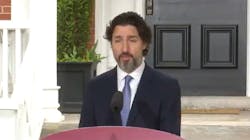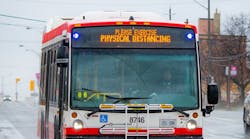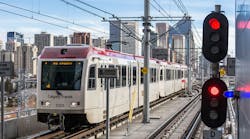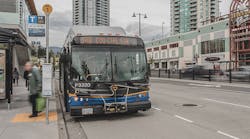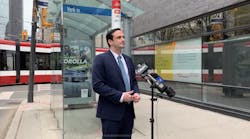Canada provides municipalities with funding advance for infrastructure projects
More than 3,600 Canadian communities will receive federal funds provided by the country’s Gas Tax Fund earlier as a means to kickstart economic activity as part of a post-pandemic recovery.
Prime Minister Justin Trudeau made the announcement regarding the accelerated funding on June 1. The prime minister’s office says the early delivery of the C$2.2 billion (US$1.62 billion) from the federal Gas Tax Fund will help communities quickly move forward with infrastructure projects that will improve quality of life and help restart local economies.
In past years, payments to communities through the federal Gas Tax Fund have typically been made in two instalments, in summer and later in the year. This would be a single payment of the full 2020-21 funding.
Communities have flexibility to use the funding to meet their local needs such as through access to high-speed broadband, improvements to water and road systems and the building of cycling and walking paths.
The Canadian Urban Transit Association (CUTA) welcomed the prime minister’s commitment to do more to help cities, but said new federal dollars are needed to prevent transit systems hollowing out.
“We welcome the prime minister agreeing that the pandemic has decimated urban finances and his commitment that more will be done,” said Marco D’Angelo, CUTA’s CEO. “But public transit’s financial crisis remains. We cannot continue to keep transporting essential workers without new federal dollars—soon. And we look forward to working with Ottawa and the provinces to solve the crisis quickly.”
CUTA notes that ridership and revenues have crashed during the pandemic, but close to a million people – many of them essential health, grocery and janitorial workers – continue to take transit in the country every day.
On March 30, CUTA asked the federal government for a series of actions to help the country’s transit systems bridge the funding chasm produced by the pandemic. The request included C$400 million (US$283.58 million) per month to help systems make up for lost revenue.
While many Canadian transit systems are feeling financially squeezed, several have had to institute cost cutting measures to help lessen the hit.

Mischa Wanek-Libman | Group Editorial Director
Mischa Wanek-Libman is director of communications with Transdev North America. She has more than 20 years of experience working in the transportation industry covering construction projects, engineering challenges, transit and rail operations and best practices.
Wanek-Libman has held top editorial positions at freight rail and public transportation business-to-business publications including as editor-in-chief and editorial director of Mass Transit from 2018-2024. She has been recognized for editorial excellence through her individual work, as well as for collaborative content.
She is an active member of the American Public Transportation Association's Marketing and Communications Committee and served 14 years as a Board Observer on the National Railroad Construction and Maintenance Association (NRC) Board of Directors.
She is a graduate of Drake University in Des Moines, Iowa, where she earned a Bachelor of Arts degree in Journalism and Mass Communication.
